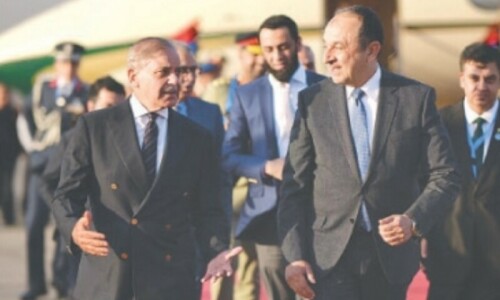THE new government that takes over after Thursday’s general election will have the briefest of honeymoon periods, with the immediate task of formulating a cogent counterterrorism policy lying before it.
Acts of terrorism continue unabated, particularly targeting police and military personnel, as the attack on the Chaudhwan police station in KP’s D.I. Khan early on Monday shows. At least 10 police personnel were martyred in the attack, which officials say was launched from multiple directions by over 30 terrorists.
A military check post in nearby Daraban was stormed by militants last December, causing over 20 fatalities. That was apparently the deadliest single attack on military men last year. The Daraban atrocity was claimed by the Tehreek-i-Jihad Pakistan, an alibi used by the banned TTP, which emerged last year.
This particular part of KP, as well as neighbouring areas of Balochistan and Punjab, were beset by terrorist violence throughout 2023. The new administration needs to ensure this grim trend does not continue in the current year. Overall, 2023 was a blood-soaked year, with some figures citing over 1,500 terrorism-related fatalities.
The challenge is two-tiered: to secure Pakistan and ensure no part of the country is available for terrorist outfits to establish themselves, while the other goal must be to prevent militants from creating sanctuaries in Afghanistan.
The new government, together with the security establishment and provincial set-ups, must hammer out a failsafe plan to secure the country, particularly those parts of KP and Balochistan suffering from frequent terrorist attacks.
The basic structure exists in the form of the National Action Plan. The key is to update it as per the requirements of the day, and implement it. Furthermore, dealing with militancy should be a one-window operation, preferably led by Nacta with input from all stakeholders.
As for the issue of terrorist sanctuaries in Afghanistan, the UN has validated Pakistan’s concerns about training camps on Afghan soil used by Al Qaeda and the TTP to foment trouble in Pakistan. The Afghan Taliban need to shut down these facilities, or else bilateral ties will suffer. Either the Taliban should stop the attacks or relocate terrorists away from the Pakistani border so that they are not able to spill blood in this country.
The Chinese foreign ministry spokesperson recently remarked that the Afghan Taliban need to “firmly combat all forms of terrorist forces”. This is the message that should be communicated from Islamabad, Beijing and all other regional capitals to Kabul’s current rulers.
Unless the new dispensation in Islamabad tackles terrorism head-on, economic stability and social cohesion will be very difficult to achieve. The security forces should also dedicate all their energies to eliminating the terrorist threat, and protecting the lives of civil and military personnel on the front line.
Published in Dawn, February 6th, 2024













































Dear visitor, the comments section is undergoing an overhaul and will return soon.